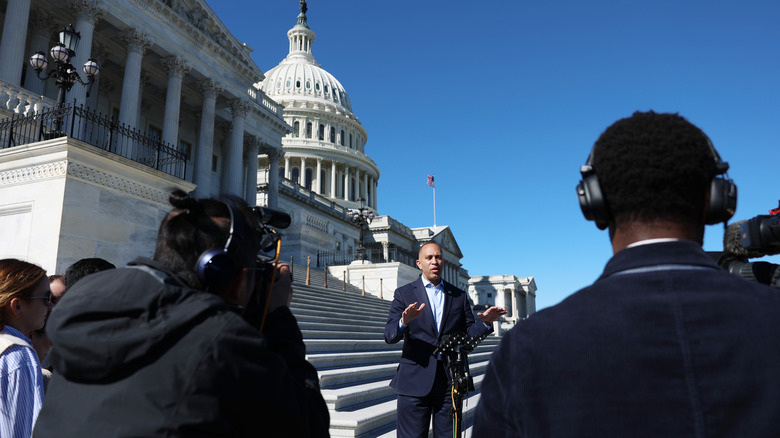This Popular Medicare Program Is At Risk And The Reason Couldn't Be Clearer
While the government shutdown hasn't stopped Treasury Department officials from talking about breaking tradition by putting President Donald Trump's image on a $1 coin, it has halted funding for a Medicare program that enabled millions of seriously ill Americans to receive treatment at home.
Telehealth appointments and in-home visits from nurses became another medical cost Medicare won't cover after the Acute Hospital Care at Home (AHCAH) program ended at the end of September 2025. As a result, patients are being brought back into hospitals as multiple healthcare organizations withdraw from the program where space is often limited. "We are particularly concerned as we go into the winter, where we see a higher number of flu and RSV and COVID cases, where hospitals typically get busier," Constantinos Michaelidis, medical director of UMass Memorial Medical Center, told Politico. As more and more people are brought back into the hospital, a waiting list of dozens of patients has already formed to get into the Central Massachusetts health center.
But overcrowded hospitals aren't the only problem. Some hospitals have stopped telehealth appointments altogether, even for people covered under private insurance. "It's a misunderstanding. I'm not really sure what's happening, but it's unfortunate and very scary," Alexis Apple, director of federal affairs for the American Telemedicine Association, told Stateline. "There's so much uncertainty out there now, and we see insurance payers start to pull back."
Why home healthcare stopped for millions of Medicare patients
Medicare's AHCAH program officially started in November 2020 during the height of the COVID-19 pandemic. Its purpose is to waive federal regulations that would have required healthcare providers to treat their Medicare patients in person if they expected to be reimbursed. It was also supposed to expire once the public health emergency was over, but Congress extended the program three times, the latest being a six-month extension that ended September 30, 2025.
The number of hospitals and Medicare recipients who participate in AHCAH is substantial. As of September 2025, 419 hospitals and health care facilities in 39 states have been approved for the AHCAH program, per the Centers for Medicare & Medicaid Services' (CMS) website. And in just the first half of 2025, 15% of Medicare beneficiaries, about 4.3 million people, participated in more than 11.1 million telehealth visits for mental health, diabetes, hypertension, chronic kidney and other conditions, according to a report from Brown University's Center for Advancing Health Policy Through Research (CAHPR).
In addition, AHCAH programs and appointments have meant lower mortality rates for patients and lower costs for Medicare compared to stays at hospitals, according to a fact sheet report from CMS. Plus, AHCAH is a lifeline for elderly people with mobility issues in rural areas. "In rural America, it's often telemedicine or no medicine at all," said David Newman, chief medical officer of Sanford Health in South Dakota's virtual care program, via the American Medical Association (AMA).
Experts say the shutdown shows how important AHCAH programs are
Kyle Zebley, senior vice president of the American Telemedicine Association, told Chief Healthcare Executive that the government shutdown is a "great example" for why the AHCAH initiative should be extended for much longer periods than it has been in the past, or better yet, made permanent.
Had the initiative remained permanent, AHCAH would have remained in place, despite the shutdown, along with other Social Security benefits that are covered by mandatory spending regulations. And even without being permanent, home healthcare for Medicare patients may have still continued if a bipartisan-supported bill pushed by Republican U.S. Representative Vern Buchanan, which would have extended AHCAH another five years, hadn't been stuck in a Senate committee prior to the shutdown, Politico reported.
In the meantime, retirees who are returning to the hospital should be aware that Medicare won't cover inpatient costs forever. Those on Medicare Part A will need to pay $419 a day after 60 days, per Medicare.gov, and those rates increase even higher after 90 days.


